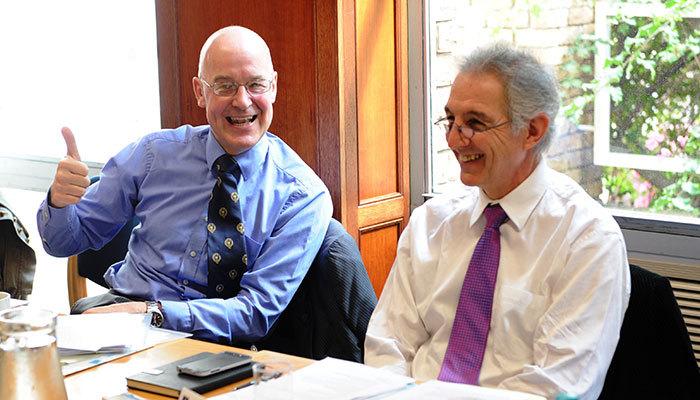UCT and Oxford collaboration: established universities with emerging solutions
26 March 2015 | Story by Newsroom
The Universities of Cape Town and Oxford are the oldest universities in their respective countries. However, as a recent visit by the University of Oxford demonstrated, longstanding and recent research collaborations are producing innovative solutions to problems of the present and creating a better future.
Effective collaboration between universities cannot happen from the top down: it needs to be research-led. This was the message from this week's visit by a high-level delegation from Oxford to UCT. The group included Oxford Vice-Chancellor Prof Andrew Hamilton and senior researchers.
The close relationship between the two universities has given rise to a range of research projects that have the potential for tremendous social impact, said UCT Vice-Chancellor Dr Max Price. They include collaboration in fields such as malaria drug resistance, food security, constitutional and customary law in Africa, as well as the development and testing of new tuberculosis vaccines.
Hamilton is enthusiastic about the great potential of collaboration between the universities' researchers in a wide range of fields. "We need now to encourage collaboration where it does not yet exist," he said. "Collaborations thrive when there is mutual need, and South Africa offers a unique environment to study some of the greatest challenges facing us today."
UCT currently collaborates and publishes with Oxford more than any other university in the United Kingdom, with neurosciences being one of the most fruitful collaborations.
"We are particularly pleased, therefore, that the launch of UCT's Neurosciences Initiative coincides with this week's visit by the University of Oxford," said Price.
The Neurosciences Initiative brings together clinicians and researchers from a wide range of specialities, fostering collaboration in the treatment of a number of neurological disorders.
Prof Graham Fieggen, UCT's head of neurosurgery and project leader of the Neurosciences Initiative, believes that the launch of this multidisciplinary initiative will only strengthen future collaborations.
Professor of neuroscience at Oxford and co-director of the Oxford Centre for Neuromuscular Science, Matthew Wood concurs.
"Neurosciences are much broader than simply understanding the brain or understanding neurological disease. Essentially it goes to the heart of who we are as human beings, and to many of the challenges that exist in society," said Wood, a UCT alumnus who is also an honorary professor at UCT.
Managing chronic diseases over the phone
One of the many collaborative projects showcased during the Oxford visit was the development of mobile phone technology for the self-management of chronic diseases such as high blood pressure. Named the SMS-text Adherence Support (*StAR) trial, it is part of m-Health (Mobile Health) development in Africa, and is a collaborative project between Oxford's Institute of Biomedical Engineering and Primary Care Health Sciences and UCT's Chronic Diseases Initiative for Africa (CDIA).
Widely used across Africa, mobile phones are a highly effective way to reach patients. In a recent trial of an intervention to improve blood pressure control, over 95% of patients receiving educational and supportive SMSes remained in contact with the project over one year.
The collaboration involved Oxford's Andrew Farmer (professor of general practice), Lionel Tarassenko (professor of electrical engineering) and David Springer (IBME). UCT researchers included Prof Bongani Mayosi (head of medicine), Prof Naomi Levitt (head of the diabetic medicine and endocrinology and director of CDIA) and Dr Kirsty Bobrow (CDIA).
Largest community based study among HIV-positive teenagers
Another project – looking for insights into the behaviour of South Africa's 1.2-million HIV-positive teenagers – seeks to understand the reasons for low rates of adherence to anti-retroviral treatment and inconsistent levels of contraceptive use.
Mzantsi Wakho, which looks at promoting antiretroviral adherence and sexual and reproductive health service access among HIV-positive adolescents, is the largest community based study among HIV-positive teenagers ever conducted. Preliminary results reveal the powerful role that stigma still plays in preventing teenagers from disclosing their HIV status to their partners.
Mzantsi Wakho is led by UCT's Dr Rebecca Hodes (director, AIDS and Society Research Unit, Centre for Social Science Research, and an honorary research fellow at UCT's Department of Historical Studies) and Lucie Cluver (associate professor of evidence-based social intervention at Oxford and honorary lecturer in UCT's Division of Neuropsychiatry). The Departments of Health, Social Development, Basic Education and Women, Children and People with Disabilities were consulted on the project's research design.
 This work is licensed under a Creative Commons Attribution-NoDerivatives 4.0 International License.
This work is licensed under a Creative Commons Attribution-NoDerivatives 4.0 International License.
Please view the republishing articles page for more information.










